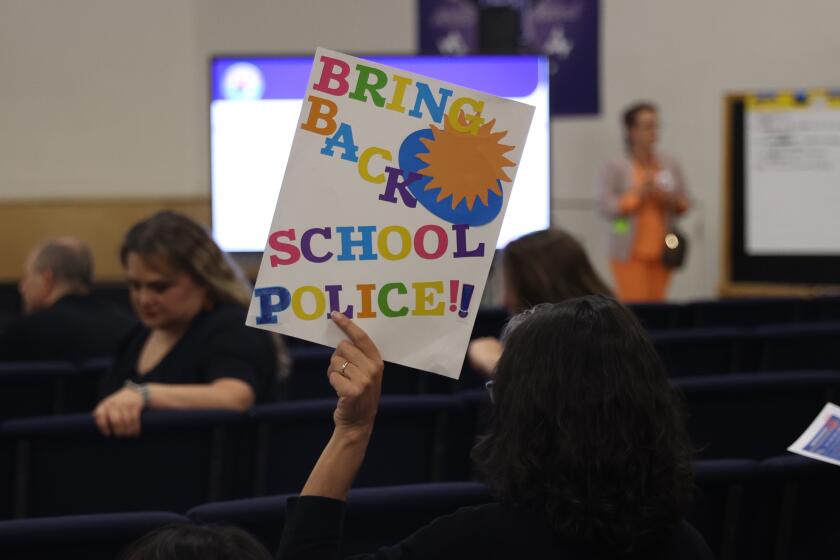Mother of Man Killed by Police Wages Fight : Court: Inquiry clears officers in 1992 Pacoima shooting. Woman files suit, alleging her son’s civil rights were violated.
Santos Gallardo says she had never seen that wild glint in her son’s eyes before and it scared her. He looked and acted crazy--drinking holy water, draping rosary beads around his neck, and claiming to be both Christ and Satan. When he grabbed for his baby half-sister and smashed the window of her Pacoima garage apartment with a broomstick, she dialed 911.
Gallardo, 40, said in an interview last week that she just wanted police to bring 18-year-old Efrain Lopez under control. “I never thought they’d kill him,” she said.
But a Los Angeles police officer, 30-year old Neil Goldberg, shot Lopez nine times during a confrontation on Nov. 9, 1992, that took 72 seconds, start to finish. The bullets pierced or grazed virtually every vital organ: heart, lungs, liver, spleen, pancreas and kidneys.
Later, police said Lopez was under the influence of phencyclidine--also known as PCP and “angel dust”--and was swinging a one-pound broomstick like a baseball bat at officers.
Police and prosecutors officially closed the book last week on the Lopez shooting, clearing the officers of wrongdoing.
But Gallardo says, one year after her son’s death, she feels nothing but anger every time she sees a police officer. “They wouldn’t kill an animal like that. They should pay for what they’ve done,” she said.
She is not willing to let the inquiries end here. She has hired a lawyer and is suing the city and the Los Angeles Police Department in U.S. District Court, alleging Lopez’s civil rights were violated. The suit also alleges that the LAPD continues to encourage police brutality by covering it up.
Attorney John C. Taylor, who has won multimillion-dollar verdicts against police departments in Torrance, Long Beach and Compton, called the investigations of Lopez’s shooting “a self-serving, biased whitewash of this incident.”
The LAPD had no comment. But a spokeswoman for the district attorney’s office defended the prosecutors’ investigation as fair and thorough.
Although 200 people marched on the LAPD’s Foothill station a year ago, the end of the official inquiry was met with barely a public whimper.
The American Civil Liberties Union of Southern California, which called a news conference to protest the shooting and criticize an allegedly “trigger-happy” LAPD, didn’t criticize the findings.
“Efrain Lopez was very high on a substance. Neil Goldberg had a really good record,” explained ACLU Executive Director Ramona Ripston.
“The decision not to prosecute, and the decision that the shooting was in policy, we’re reluctant to challenge that.” But, Ripston added, “We need to have better ways to deal with people who are drunk or who are under the influence of drugs, other than shooting them.”
At this point, Gallardo and her lawyer stand alone in the court of public opinion. But, by taking their case to federal court--which has more liberal rules about what documents, tape recordings and other information they can subpoena from the LAPD--they hope to get to the bottom of what happened to Lopez on Nov. 9, 1992.
Taylor said the police chief and district attorney’s reports quote only police and people who told investigators what they wanted to hear. And Gallardo says the police have put words in her mouth.
She disputes the official version, especially the district attorney’s report, in which she is quoted as telling officers Lopez had struck her and threatened to kill his half-sister, 11-month-old Michelle.
She says Lopez never threatened to kill the baby. “He loved her. He would never do anything to hurt her,” she said. And, she said, he never struck or shoved her, although he did pull her hair when he reached for the child.
“They (police) never asked any questions. I don’t now where they got that,” Gallardo said. Her name is misspelled throughout the police chief’s report.
According to summaries of the investigation included in both reports, the events leading to Lopez’s shooting death took about 15 minutes to unfold.
According to police records, a neighbor in the 13100 block of Eustace Street first summoned officers at 12:55 a.m., reporting a prowler in his back yard who had asked him for liquor. Five minutes later, Gallardo called from her garage apartment in the next block. The district attorney’s report quoted her in an excerpt of the 911 tape: “Here, my son is acting crazy. He is hitting me.”
By the time officers Ralph Gonzalez and Jeffrey Chang arrived, Lopez had gone.
But at 1:10 a.m., officers Goldberg and Dean Gizzi spotted a man in a bloody T-shirt a few blocks away at the intersection of Borden Avenue and Weidner Street. First assuming he was an assault victim, they turned their car around. What happened next took just 40 seconds, according to the chief’s report:
A man, Steven Early, had Lopez “restrained”--neither report specifies whether they were on the ground. The officers still failed to recognize Lopez, who was dressed in socks, T-shirt and underwear, as the initial prowling suspect and ordered Early to let him go.
The officers ordered Lopez to drop the broom. Instead, he dashed between them and into the street. Goldberg, fearing Lopez might try to fight, called for backup.
The officers followed Lopez onto the street, where he was holding the 49-inch broom by the bristles and swinging it wildly. From about six feet away, officers Goldberg and Gizzi repeatedly ordered Lopez to drop the broom. But Lopez first rushed Gizzi, raised the broomstick over his right shoulder and used a “baseball type swing” directed at Gizzi’s head. Gizzi ducked and avoided the blow, but bystanders told police they thought he’d been hit.
Meanwhile, Goldberg dropped his baton and pulled his service revolver. He ordered Lopez to drop the broom. Instead, Lopez turned toward Goldberg, and the officer, fearing for his life, fired the first two rounds and cried into his radio: “Officer needs help.”
Within another 32 seconds, it would be over. Lopez continued to advance. Goldberg fired two more shots. With four 9 millimeter bullets in him, Lopez continued unfazed, still swinging the broomstick. Goldberg fired two more shots; Lopez kept swinging. Finally, a three-shot volley dropped Lopez.
The officers’ version is supported by other eyewitness accounts from individuals who told the district attorney’s investigators they usually are not supportive of the police, the report said.
They were identified as Karen and Steven Early--the man who was struggling with Lopez when officers arrived--and Steven’s father and nephew, Norman Early Sr. and Norman Jr.
The district attorney’s report quoted several witnesses who said the officers had no other choice.
But Taylor said his investigators have found other witnesses who believe police did not have to shoot Lopez. He declined to discuss specifics, citing legal strategy.
Before police arrived, Steven Early and Norman Early Jr., who are taller and heavier than Lopez, said in the report that they had forced him to the ground four times, but he kept getting back up. Neither report specifies whether Lopez ever let go of the broom.
Norman Early Sr. described Lopez’s actions as “similar to Superman.”
Attorney Taylor says police escalated the violence by ordering Steven Early to let Lopez go, when officers could have handcuffed him.
The Police Commission last week followed Chief Willie Williams’ recommendation that Goldberg and Gizzi receive additional tactical training, but not face disciplinary action.
“Some more training and my son would be alive? You’re kidding,” Gallardo said Friday.
Clearing Goldberg of any criminal wrongdoing, prosecutors Christopher A. Darden and Frank E. Sundstedt determined that if he were charged and tried, a jury would likely find that the shooting “falls within the parameters of the laws defining justifiable homicide. Goldberg would claim that he tried not only to repel a dangerous assault but he also acted in self-defense.”
The prosecutors found that even a broomstick wielded in such a manner can be a deadly weapon. Lopez had broken a window and a car’s back windshield with the broom, they concluded.
But Taylor says portraying a one-pound broom as a deadly weapon is quite a stretch. “He was swinging wildly. He was almost falling over. I don’t think a reasonable person would consider that to be life-threatening,” Taylor said. “I would definitely hope that a trained police officer with a partner and backup on the way would not perceive it as a situation where his life is being threatened.”
He added, “This whole situation is really stinky.”
More to Read
Start your day right
Sign up for Essential California for news, features and recommendations from the L.A. Times and beyond in your inbox six days a week.
You may occasionally receive promotional content from the Los Angeles Times.






